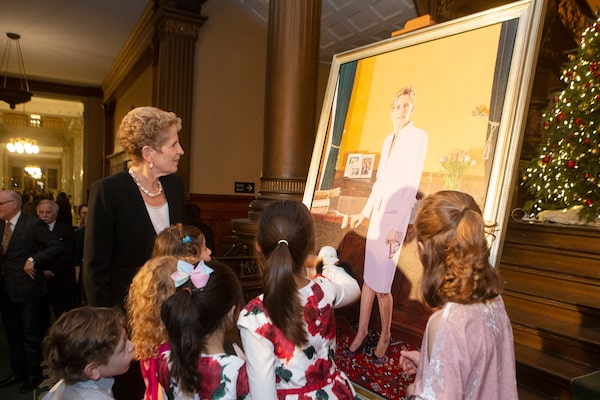
Former Ontario premier Kathleen Wynne shows her portrait, painted by Linda Dobbs, to children from her constituency after its unveiling ceremony at the Ontario Legislature in Toronto, on Nov. 9, 2019.Chris Young/The Canadian Press
Her portrait now hangs outside of Doug Ford’s office at the Ontario Legislature: the only female premier in the province’s history.
The painting, which has Kathleen Wynne dressed in a pink suit, with a scarf draped on her chair and books about Pierre Trudeau and lesbian parenting on her desk, depicts who she is and what she stood for during her five years in office.
For Ms. Wynne – whose Liberal Party lost in the June, 2018, election to Mr. Ford’s Progressive Conservatives – it was crucial to get her likeness on the wall as soon as possible.
“There are hundreds of little girls who go through this building every day, with their boy classmates, and I just think it’s important for them to see the possibility," Ms. Wynne, one of only a handful of Liberals who were re-elected in 2018, said in an interview in her Queen’s Park office.
"Right now, they see every premier and they’re all white men. And so there needs to be an opening of that door.”
Ms. Wynne, who was Ontario’s 25th premier from 2013 to 2018, was the first woman, as well as the first openly LGBTQ person to serve in the role.
In total, Canada has only had 13 female first ministers, including former prime minister Kim Campbell. Although several won majority governments, none were re-elected to one.
There’s currently only one female premier in the country, the Northwest Territories’ Caroline Cochrane. Ms. Cochrane was not available for an interview, but Northwest Territories MLA Julie Green said in a blog post that she and Ms. Cochrane were determined in the past election to increase the representation of women in the House. Women now make up nearly half of elected members in the territories.
Still, the 66-year-old Ms. Wynne says it is “hugely disappointing” that provincial leadership across the country is now made up almost entirely of men. The lack of female representation at the helm, she said, has broad-ranging effects on public policy, citing everything from the economy to health care to child care. Women, she says, bring different perspectives to the table.
It’s a far cry from 2013, when there were six female premiers, including Ms. Wynne.
“I think it’s the exception that proves the rule," Ms. Wynne said of the 2013 provincial makeup. “We look at that moment in time and every other configuration of premiers has looked very different than that. So we know it’s possible, but we just know that it’s very hard to sustain it.”
Ms. Wynne led her party to a historic defeat in the June, 2018, election, winning only seven seats (now down to five). Her personal unpopularity, tied to policies such as rising electricity costs, was integral to the loss, but she said misogyny and homophobia also played a role in the 2018 election campaign. “It is the fact that more misogyny, more xenophobia, more discrimination is with us today than maybe 20 years ago," she said.
The reasons for the current dearth of female premiers are complex, said Kathy Brock, a political science professor at Queen’s University who has studied women and politics. Some of it is natural turnover, with the public electing leaders far different than their predecessors.
“Some of the continuing barriers to women getting involved in politics are still there," she said, citing factors such as increased scrutiny for women, difficulty in recruitment and maternity leaves, which can interrupt a woman’s career.
“The change is coming, it started with people like Kathleen Wynne, but it has still got a ways to go," she said.
Christy Clark, who was premier of British Columbia from 2011 to 2017, said she believes women are treated differently by the media, recalling a columnist who described her as “ambitious” early in her career as if it were an insult.
“Corrupt, vain, stupid – that tone pervades so much of the media coverage and the social-media discussion around women," she said.
“Seeing what happened to a lot of the women who were in office, and how brutal it was for some, I think it actually had the opposite effect, which may have made more women a lot more skeptical about running for office."
Still, she said she sees a generational change happening, where young people are more aware of biases toward women and minorities – and less likely to tolerate them.
At Ms. Wynne’s portrait unveiling in early December at Queen’s Park, political differences were put aside.
Mr. Ford had kind words for his former political rival, whom he praised for her passion and drive.
“Thanks to Kathleen, girls across this province know they can grow up and become anyone they want to be, including premier," he said.
“My hope is that this portrait will one day be joined by others showcasing talented women of every political stripe that Kathleen has inspired."
 Laura Stone
Laura Stone